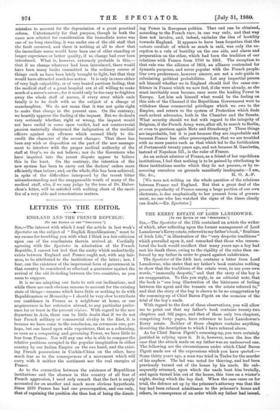LETTERS TO THE EDITOR.
ENGLAND AND THE FRENCH REPUBLIC.
go THE EDITOR OF TEE "SPECTATOR."]
Sra,—The interest with which I read the article in last week's Spectator on the subject of "English Republicanism," must be my excuse for troubling you with what I think is a fair criticism upon one of the conclusions therein arrived at. Cordially agreeing with the Spectator in admiration of the French Republic, I cannot but feel that the amity which undoubtedly exists between England and France ought not, with any fair- ness, to be attributed to the institutions of the latter; nor, I fear, can the existence of the impersonal form of government in that country be considered as effectual a guarantee against the revival of the old ill-feeling between the two countries, as you seem to suppose.
It is no use adapting our facts to suit our inclinations, and while there are such obvious reasons to account for the existing state of things—reasons which have little or nothing to do with Republicanism or Monarchy—I should be very slow to attribute our confidence in France as a neighbour at home, or our acquiescence in her extension abroad, to any particular prefer- ence for or trust in the present 9-ggime. With regard to the new departure in Asia, there can be little doubt that if we do not fear French military or commercial rivalry in the East, it is because we have come to the conclusion, an erroneous one, per- haps, but one based upon wide experience, that as a colonising, or even as a conquering and governing Power, we have little to fear from France. Nor will any one who is able to compare the relative positions occupied in the popular imagination in either country by our Indian Empire on the one hand, and the exist- ing French possessions in Cochin-China on the other, have much fear as to the consequences of a movement which will carry with it neither the sentiment nor the real energies of France.
As to the connection between the existence of Republican institutions and the absence in this country of all fear of French aggression, I need only remark that the fact is amply accounted for on another and much more obvious hypothesis. Since 1870 France has had one preoccupation, and one only, that of regaining the position she then lost of being the direct- ing Power in European politics. That end can be obtained, according to the French view, in one way only, and that way does not involve, and, indeed, excludes the idea of hostility towards England. It appears to have been forgotten that the entente cordials of which so much is said, was only the ex- ception to a rule of hostility on the one side, and alarm and preparation on the other, which had been the tradition of our relations with France from 1790 to 1861. The exception to that rule was the alliance of 1854, an alliance contracted for dynastic purposes, and never popular with the French people.. Our own preferences, however sincere, are not a safe guide in calculating political probabilities. Let any impartial person ask himself whether we in England should feel the same con- fidence in France which we now feel, if she were already, as she must inevitably soon become, once more the leading Power in Europe. Let him ask himself what would be the feeling on this side of the Channel if the Republican Government were to. withdraw those commercial privileges which we owe to the Empire, and return to the system of Protection which finds such ardent advocates, both in the Chamber and the Senate.. What security should we feel with regard to the integrity of Belgium, if the French Army were, alter all, to march to Berlin, or even to garrison again Metz and Strasbourg ? These things are improbable, but it is just because they are improbable and because France has other preoccupations, that we are troubled with no more panics such as that which led to the fortification of Portsmouth twenty years ago, and not because M. Gambetta, instead of Napoleon Ill., is the ruler of France.
As an ardent admirer of France, as a friend of her republican institutions, I feel that nothing is to be gained by attributing to those institutions merits which they do not possess, or by re- assuring ourselves on grounds manifestly inadequate.—I am,.
[We were not writing on the whole question of the relations between France and England. But that a great deal of the present popularity of France among a large portion of our own electorate, is due emphatically to her present form of govern- ment, no one who has watched. the signs of the times closely can doubt.—En. Spectator.]


































 Previous page
Previous page